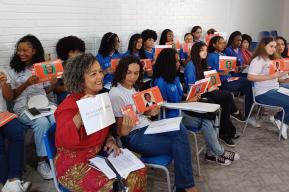A student at Azeez Shaheen school, Tharwat Assi is a 15-year old girl from Ramallah. She has reflected, through this conversation, which UNESCO conducted on the occasion of the 16 day of activism campaign, the potential power that would bring about the desired change and contribute towards diminishing gender-based violence in our community.
The conversation took place with Tharwat as follows:
Q. Do you think males and females are different?
A. In my view, variance between males and females is only biological.
Q. If it is only biological, how would you explain the vulnerability and marginalization of women and girls in the Palestinian society?
A. I think this is highly attributed to cultural aspects; starting with the family unit where roles are differently assigned granting males superiority over females, and then those roles are being replicated and generalized at the community level.
Q. What aspects do you think represent a vivid manifestation of such discrimination?
A. I believe this includes all aspects of females’ lives; as a child, girls are less-privileged than boys and the latter are brought up in a manner encouraging some actions perceived as manhood traits, while on the other hand suppressing females, which brings about the model roles for each gender, mainly defined based on cultural norms. As an adult, a woman remains obedient to the male figure of her spouse. Even if divorced, women return to obedience of males in their families.
Q. How would this impact the lives of women and girls?
A. Well, when females lack empowerment and are prevented from accessing opportunities and rights on equitable basis as males, allowing them to practice decision-making, they lose control over all aspects of their lives; that is why we experience early marriage, high rates of gender-based violence, exploitation and abuse.










